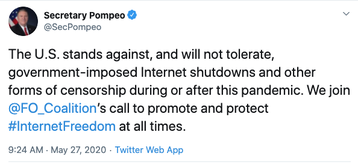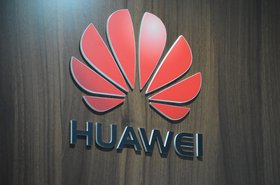One of the great joys of being a data center journalist is how infrequently I have to write about President Trump.
There's the odd story, of course. There's the chip plant he announced - that was already being built under Obama - the public interference with a cloud contract, and his spiraling and inconsistent war on Huawei. Mostly, though, I get to write about building construction, M&As, semiconductor designs, and all sorts of things that thankfully don't directly involve the world's most famous individual.
Sadly, today is an exception. As part of our coverage of the Internet infrastructure community, DCD has increasingly looked to report on state surveillance, interference, and network shutdowns.
For the cover feature of last November's magazine, we spoke to digital censorship researchers tracking shutdowns, lawyers in India fighting them, individuals in Kashmir suffering from them, politicians in Hong Kong fearing them, and more.
Every time the story was the same: Authoritarian figures were using their power to disconnect and disenfranchise the weak in the name of maintaining order. The more autocratic the regime, the more it tried to close the web.
That brings us to today. The US has long had one of the most 'free' Internets - sure, there was a high chance that you were being surveilled, but at least you were free to post almost anything. Platform operators, meanwhile, were free to moderate their systems however they liked (bar a few sensible restrictions on terrorism, child pornography, and the like) - so you could have censorious forums for families, or free-for-alls like 4chan.
Now, however, the President of the United States has threatened to shut down social media platforms he doesn't like.
The day after Twitter added a fact-check warning to his tweets claiming that mail-in ballots are fraudulent, the world leader tweeted: "Republicans feel that Social Media Platforms totally silence conservatives voices.
"We will strongly regulate, or close them down, before we can ever allow this to happen. We saw what they attempted to do, and failed, in 2016. We can't let a more sophisticated version of that.... happen again."
This threat, whether it is carried out or not, smacks of the same authoritarian actions of nations the US claims to be better than.
"Shutting down entire communication channels is an authoritarian practice," Jan Rydzak, one of the researchers I spoke to last year, said about Trump's latest move. "Threatening to shut down entire communication channels is an authoritarian practice."
It's also something that threatens much of the Internet around the world. Historically at the center of most international tech organizations, the US has been crucial in defining what people saw as the free web, and has been held up as the standard many countries should judge themselves by.
Indeed, and somewhat ironically, today also saw Secretary of State Mike Pompeo issue a strongly-worded tweet (above) in favor of Internet freedoms, in response to a warning from the Freedom Online Coalition, drafted with help from the US, against the use of "arbitrary or unlawful surveillance practices, network shutdowns, and censorship" that governments may be tempted to impose as part of their response to the Covid-19 pandemic.
Is it off-the-cuff?
It is, of course, hard to know if the President's comments are simply off-the-cuff wails of anger, or a call for a concerted legislative push. Unfortunately, it comes after similar, albeit less direct, attacks on social media platforms in the past.
But even if these tweets mark the extent of his actions, it is a step too far. Just as calls of "fake news" have spread across the world, diminishing the free press in lands far and wide, calls to silence social networks in the US will forever damage the web.
We've all become so numb to this over the last few years that it almost feels pointless writing about it. But it's still something we need to be aware of, that we have to push back against. This is not normal, and it should never become normal for the President to threaten Internet platforms.





